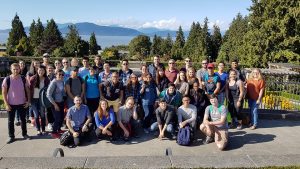AAPT-2019 Invited Talk
On January 8, 2018 I will be giving an invited talk at the Winter-2018 National Meeting of the American Association of Physics Teachers in San-Diego, California. I am very excited about it as my talk will focus on something, I have been very interested for a while: the opportunities that we overlook while teaching in a foreign language. It is very common to think that not having English (or whatever is the language you are teaching physics in is) as your first language is a huge drawback. I think we forget that there are also many pluses here. I try to emphasize it while I work with future physics teachers here at UBC. I hope my talk will be of interest to the attendees. Below I posted the information about my talk:
Session FH: Teaching and Learning Physics in a Second Language
Location: Royal Palm Five/Six Sponsors: Committee on International Physics Education, Committee on Diversity in Physics
Time: 7:00-8:00 p.m. Date: Monday, January 8 Presider: Geraldine Cochran
FH01 7:00-7:30 p.m. Teaching Physics in a Foreign Language: Challenges and Opportunities
Invited – Marina Milner-Bolotin, University of British Columbia, 2125 Main Mall, Vancouver, British Columbia V6T2K1Z4 Canada; marina.milner-bolotin@ubc.ca
With the growing number of North American physics teachers for whom English is their second, third, or even fourth language, we often focus on the challenges they face in our classrooms. However, this disregards the fact that many North American students are also non-native English speakers. Moreover, teaching requires much more than mastering the language, such as cultural fluency and familiarity with local education system. How does that affect physics teaching? By focusing solely on these challenges, we forget that physics teachers who come from different countries also have significant advantages compared to their native counterparts. By “speaking” multiple languages and cultures, they can trace the history of international science curricula and terminology. They can also better relate to non-native English speaking students. In this presentation I focus on advantages of teaching physics in a foreign language that are often overlooked in teacher education programs and in the teaching practice.
